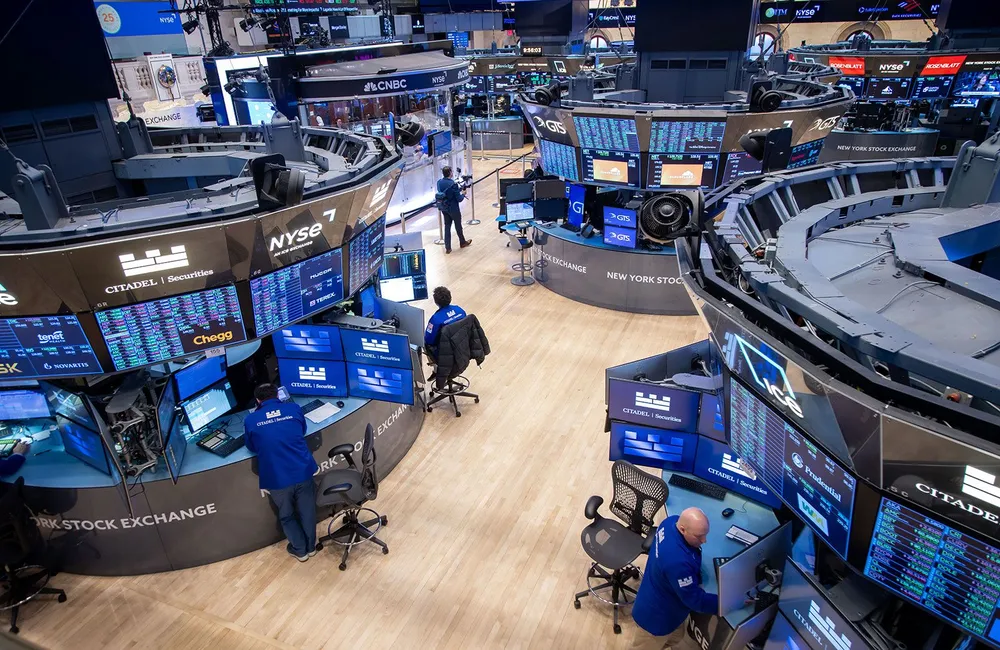A 1% drop in March retail sales dragged US indices lower and overshadowed positive Q1 earnings from major banks.
ASX futures were leaning 8 points or 0.1% higher as of 6:00am on Monday, suggesting a positive open.
US stocks finished lower on Friday following hawkish comments from a top Federal Reserve official and downbeat retail sales data.
The S&P 500 fell 0.2%, while the Dow Jones Industrial Average and the Nasdaq Composite both declined by 0.4%. All three indices logged weekly gains, however, with the S&P 500 rising 0.8%, the Dow Jones gaining 1.2% and the Nasdaq adding 0.3%.
Advance retail sales showed consumer spending fell twice as much as expected in March. Retail sales declined by 1% last month, more than the 0.5% drop expected by economists polled by Dow Jones, in part because consumers paid less for fuel.
In commodity markets, Brent crude oil gained 0.4% to US$86.42 a barrel while gold dropped 1.7% to US$2,006.12.
Australian government bonds were higher, with the 2 Year yield increasing to 2.96% and the 10 Year yield climbing to 3.32%. US Treasury notes were lower, with the 2 Year yield falling to 4.09% and the 10 Year yield slipping to 3.51%.
The Australian dollar fell to 67.05 US cents from its previous close of 67.82. The Wall Street Journal Dollar Index, which tracks the US dollar against 16 other currencies, edged up to 95.68.
Asia
Chinese shares ended higher, extending morning gains amid upbeat sentiment. Positive economic data from China earlier this week helped brighten the mood, while declining US supplier prices signalled that inflation is easing. Chip makers and telecoms led the gains. Naura Technology rose by its daily limit of 10% after robust Q1 earnings, and China Mobile was up 3.4%. Travel-related stocks were among the losers. BTG Hotels fell 2.6% and China Tourism Group Duty Free fell 1.1%. The Shanghai Composite Index ended 0.6% higher at 3338.15 and finished the week 0.3% higher. The Shenzhen Composite Index rose 0.4%, and the ChiNext Price Index was up 0.9%.
Hong Kong's benchmark Hang Seng Index advanced 0.5% to 20438.81 and finished the week 0.6% higher. Investor sentiment was lifted by China's positive economic data and signs that US inflation is easing. Auto makers and semiconductor companies led the session's gains. BYD Co. rose 2.1%, Geely Automobile Holdings was up 3.9% and Semiconductor Manufacturing International Corp. jumped 7.2%. Tech companies were mixed with Baidu down 3.1% and Alibaba Group up 0.4%. The Hang Seng Tech Index closed up 0.1%.
Japanese stocks ended higher, led by gains in trading houses, as concerns eased about US inflation and the Fed's further tightening. Itochu gained 4.5% and Marubeni added 3.2%. Fast Retailing jumped 8.5% after posting strong quarterly results and raising its annual earnings guidance. The Nikkei Stock Average rose 1.2% to 28493.47.
The Bombay Stock Exchange of India was closed Friday to celebrate the birthday of Ambedkar Jayanti.
Europe
European stocks rose after upbeat US banking results, though Wall Street lost ground amid economic jitters. The pan-European Stoxx Europe 600, the French CAC 40 and the German DAX each added 0.5%.
The United Kingdom’s FTSE 100 closed up 0.4%, marking its eighth consecutive day in positive territory. The financial services sector led the British index higher, while investor optimism that the Federal Reserve might cut interest rates later this year also gave European markets a boost. Among the FTSE’s top risers, Standard Chartered shares rose 4.4%, followed by Persimmon, up 3.4%. HSBC Holdings closed up 3%, with the group announcing Friday that its French-unit sale became less certain and faces a potential delay. Specialist insurer Hiscox shares had the worst performance of the index with a 2.95% fall, followed by Admiral, down 2.6%.
"The FTSE 100 and other European indices have rounded off the week with some more gains, taking their cue from better US earnings," IG analyst Chris Beauchamp wrote. "In the US, however, indices have slipped as poorer retail sales numbers signalled some consumer-spending weakness that has investors fretting again about a US recession."
North America
US stocks finished lower on Friday following hawkish comments from a top Federal Reserve official and downbeat retail sales data.
The S&P 500 fell 0.2%, while the Dow Jones Industrial Average and the Nasdaq Composite both declined by 0.4%. All three indices logged weekly gains, however, with the S&P 500 rising 0.8%, the Dow Jones gaining 1.2% and the Nasdaq adding 0.3%.
Advance retail sales showed consumer spending fell twice as much as expected in March. Retail sales declined by 1% last month, more than the 0.5% drop expected by economists polled by Dow Jones, in part because consumers paid less for fuel.
“Retail sales came in weaker than expected, but a lot of the miss had to do with lower gas prices, which all things being equal is a slight positive for spending,” wrote Chris Zaccarelli, chief investment officer at Independent Advisor Alliance.
“Inflation has been coming down as gas prices have been coming down, but that can reverse in an instant, which would drive the headline numbers higher. What is more concerning is that core (which excludes food and gas prices) has been stubbornly high – and where we believe the risks to higher-rates-for-longer lie,” Zaccarelli added.
The disappointing retail sales data offset excitement around strong corporate earnings. JPMorgan Chase reported record revenue that beat analysts’ expectations, with the stock rising more than 7%. Wells Fargo shares briefly rose as much as 2.1% after the bank reported growing profits, before closing about flat. These were the first bank earnings since the collapse of Silicon Valley Bank and Signature Bank last month.
Elsewhere, UnitedHealth, which has the biggest weighting in the Dow, fell 2.7% after what Mizuho described as a “modest beat and raise.” The action came after UnitedHealth said it’s spending more for new diabetes and weight loss drugs from Novo Nordisk and Eli Lilly.
Meanwhile, Boeing closed lower by more than 5%. On Thursday, the aircraft manufacturer warned of delivery delays for some of its 737 Max planes.





















